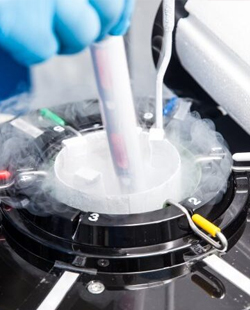Frequently Asked Questions
Sperm freezing, or cryopreservation, is the process of preserving sperm cells for later use. This helps preserves a man’s sperm cells to maintain fertility if he is undergoing any treatment that jeopardises his future fertility or, in some cases, to store good sperm until such time that the individual is ready to parent a child. This procedure helps men at risk of reduced fertility from cancer or other health concerns.
Sperm freezing can be done at a sperm bank, and these are often available with the fertility centre itself. Otherwise, specialised sperm banks exist as standalone entities and provide facilities for collecting, storing, and retrieving sperm as required. The advent of technology makes it possible for individuals to collect their ejaculate sample at home and deposit it with a sperm bank, instead of having to visit one for sperm collection specifically.
Once an individual has decided on sperm freezing, he may consult a fertility expert or a sperm bank directly to make an appointment. The sperm deposit can be made either at the bank or collected in a collection kit at home. It is best to abstain from sexual activity 2-3 days before making your sperm deposit.
Any healthy individual with some sperm sample present in his ejaculate can be a good candidate for sperm freezing. However, to accrue maximum benefit from the process, it is ideal for the candidate to be below the age of 40 with good physical health, no underlying conditions, and no history of infertility or hereditary cases of infertility within the close family/relatives.
Men above the age of 40 or undergoing cancer treatment could be considered candidates unsuitable for sperm freezing as the chances of good outcomes become increasingly difficult with age and the effects of the cancer treatment. Being in poor physical health is also a negative indicator, but this can be corrected by switching to a healthier lifestyle and taking six months before freezing.
No. There are no risks either to the individual freezing his sperm or to the offspring thereof. Freezing sperm is an entirely risk-free procedure, while children born out of frozen sperm have no more or no fewer risks associated with congenital disabilities. Sperm freezing has now been a well-established practice for well over half a century, and with advanced cryopreservation techniques now available, it is safe and perfectly risk-free.
The procedure for sperm sample collection at a sperm bank includes – making an appointment for the deposit, having a discussion with the fertility expert, and then making a deposit in a sterile specimen cup. The individuals can often get anxious or uncomfortable in a hospital setting, and therefore clinics ensure a wholly private and comforting environment for the same. Once collected, then lab technicians analyse the samples for volume, viscosity and pH levels.



